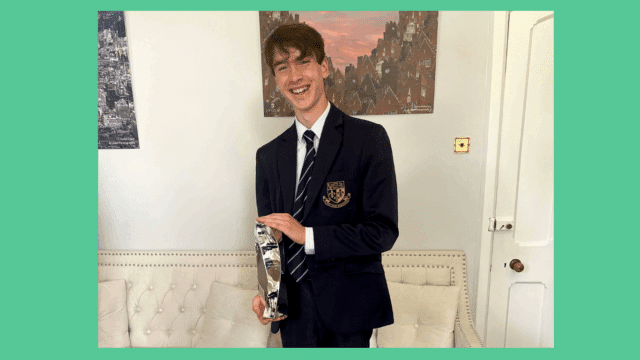Brigadier Hugh Llewellyn Glyn Hughes (1892-1973). CBE, DSO, MC, QHP, RAMC, MRCS, LRCP (Eng), FRCGP
“His striking appearance – a piercing eye amid strong features – and his capacity for quick and confident decision made him a natural leader, commanding loyalty and respect from subordinates. He loved action, and if it didn’t come to him, he sought it.” The Lancet (1973)
The First Allied Medical Officer to enter the Belsen Concentration Camp after the Second World War
On 15 April, 1945, while attached to the 11th Armoured Division, Brigadier Hugh Llewellyn Glyn Hughes became the first Allied Medical Officer to enter the concentration camp at Bergen-Belsen. He immediately took charge of the camp and set about managing the two main issues that faced him: a typhus outbreak, and the distribution of food. He also took control of the local hospital, reorganising it to accommodate more patients. The hospital was later renamed the Glyn Hughes Hospital in his honour.
Hugh Llewellyn Glyn Hughes was born in Swansea, South Wales, the son of Dr HG Hughes, but spent the first two years of his life at Ventersburg, South Africa, after his father emigrated to take up a medical post. When Hugh was only two years old, he and his mother returned to England after his father died from septicaemia.
His career at Epsom was extraordinary
At the age of seven he was diagnosed with having curvature of the spine and for a period was confined to a spinal carriage but, having put medical problems behind him, he entered Epsom College in 1903, at the age of 11, as a Foundation Scholar, joining Forest House. His career at Epsom was extraordinary. He was Head Prefect, Captain of the Rugby XV, the Shooting VIII, and the Gymnastics VIII. He was awarded the Harvey, Wakley, Brande Good Conduct, Elocution and Brande English Prizes, and in addition to these honours he was awarded the Ann Hood and Carr Exhibitions, as well as an Entrance Scholarship to University College Hospital which awarded him an onward financial scholarship from Epsom College, where he won the Fellowes’ Medal for Clinical Medicine.
Conspicuous gallantry and devotion to duty during operations
Glyn Hughes joined the British Army in 1915 and during the First World War served as a medical officer with the 1st Battalion, the Wiltshire regiment, and later with the Grenadier Guards. He had a distinguished war record and, in 1916, was awarded the DSO, his citation reading: “For conspicuous gallantry and devotion to duty during operations. He went out in broad daylight, under heavy fire, and bandaged seven wounded men in the open, lying out in an exposed spot for one and a half hours. At nightfall he led a party through a heavy barrage and brought the seven men back.”
Within four months he was awarded a Bar to his DSO, and later the Military Cross (MC), and the Croix de Guerre avec Palme. He was mentioned in dispatches on several occasions. His DSO Bar citation read: “For conspicuous gallantry and devotion to duty during operations. On four separate days he showed utter contempt for danger when collecting and tending the wounded under heavy shell fire.”
His Military Cross citation reads: He worked day and night in the open, in spite of the heaviest shell and machine-gun fire, tending the wounded and helping them back to safety, with a spirit of cheerfulness and self-sacrifice rarely seen.”
After being wounded in 1918 he still continued to perform his duties, until the wound necessitated his evacuation. The wound, however was a bad one, entering just under his femoral artery and penetrating the hip joint, which became infected and took a long time to heal. However, he had recovered sufficiently to return to the Front in time to serve out the last weeks of the War with the Grenadier Guards.
Captain Stanley Parker, who served with Glyn Hughes wrote:
“It’s impossible to think of France in World War I without thinking of Glyn Hughes… By rights he should have been back in the regimental aid post waiting for casualties to be brought back. But not him, he was up there in the attack going over the top with the men, attending them as they got wounded. That’s where I remember the occasion when he amputated some fellow’s foot with a pocket knife and saved his life.”
On his return from the War, his scholarship from Epsom College was renewed so that he could return to University College Hospital to continue his medical studies. Perhaps he chose Chagford in Devon to begin General Practice partly, as he later suggested, because he still suffered from tightness of the chest from the effects of gassing in 1917, and in Chagford he enjoyed the fresh air, riding to see patients on horseback.
At the commencement of the Second World War Glyn Hughes committed himself again to the British Army.
A Brigadier now, Glyn Hughes was Deputy Director Medical Services with the Second Army and, in April 1945, he found himself as the medical officer in charge of the rescue and relief of Bergen-Belsen Concentration Camp. He eventually had at his disposal nine units of the RAMC, the Royal Artillery, the Royal Army Service Corps, the American Field Service, the Red Cross and United Nations staff.
In addition, 97 medical students from the London Teaching Hospitals were flown to Belsen and of these students, seven were from Epsom College. Between 15 April, when the first medical officer entered Belsen to 21 May when the camp was burnt down on the orders of Glyn Hughes, some 29,000 people were evacuated from the main concentration camp, most of whom were Jewish; almost 21,000 corpses were buried. Glyn Hughes had direct responsibility for the care of the inmates to whom he displayed warmth and gentleness in all his dealings. At the end of the war he was made a Commander of the Order of the British Empire and awarded the USA Legion of Merit.
Awarded the Order of St John of Jerusalem and the Legion of Merit
In 1945 Brigadier Glyn Hughes was one of the main witnesses for the prosecution in the Belsen Trial, and for his actions at Belsen he was awarded the Order of St John of Jerusalem and the Legion of Merit (USA). He also received a second Bar to his DSO, for action during the attempted relief of Arnhem, earlier in the campaign, where as the most senior surviving officer, he took command of the tanks. Later that year he was awarded the CBE.
Played an important role in the administration of the newly created National Health Service
After the War, Glyn Hughes was appointed Commandant of the Royal Army Medical Corp Depot at Crookham and Inspector of Training. Brigadier Glyn Hughes left the Army in 1947, and was appointed the Senior Medical Officer of the South East Metropolitan Hospital Board. In this position, he played an important role in the administration of the newly created National Health Service, and in 1952 he was instrumental in the formation of the Royal College of General Practitioners. He was then appointed Honorary Physician to HM the Queen, President of the Harveian Society, Medical Officer to the Red Cross Society, President of the Barbarians Rugby Club and Vice-Chairman and Treasurer of Epsom College.
(An extract from the case made by Epsom College to have him honoured as ‘Righteous Among the Nations’ at Yad Vashem (The World Holocaust Remembrance Centre):
The role Glyn Hughes played in the liberation of Bergen-Belsen not only directly saved many Jewish lives (during the operational period from 15 April 1945 until Victory in Europe Day (VE Day) on 8 May 1945), but his own singular actions went well beyond his duties as Chief Medical Officer. He liberated the camp, entered the huts in person, and immediately set in motion rescue efforts – tirelessly striving, in an unprecedented situation in terms of human anguish, starvation, disease, and chaos – to save as many lives as possible… with little concern for his own safety from typhus and other diseases which were rampant in the infirmary and the huts.
An outstanding rugby player
Outside of medicine and his military career, Glyn Hughes was an outstanding rugby player. After Epsom he played club rugby for Blackheath R.F.C., and in 1912 was selected to play for the Barbarians against Penarth, Cardiff and Swansea. He played for the Barbarians on no less than 20 times and captained the team for three matches in 1919 and 1920. He also captained the United Hospitals team, and played for Devon, Middlesex and London Counties. After retiring from playing rugby Glyn Hughes was chosen to act as referee in the Great Britain tour of Argentina and was appointed President of the Barbarians. In The Official History of the Barbarian Football Club, written by Nigel Starmer-Smith, a former English international and teacher at Epsom College (1967-1971), it was noted that ‘Hughie’ Glyn Hughes “remained an avuncular figure, not averse to the high jinks on a Saturday night that he himself had enjoyed in his playing days, but insistent on a certain discipline, imparted with a curt word or a piercing look, that made his feelings quite clear. One knew what was expected, and if as a player, one stepped beyond the bounds, one made sure that Hughie didn’t find out.”
Brigadier Hugh Llewelyn Glyn Hughes, C.B.E., D.S.O.**, M.C., Legion of Merit, Croix de Guerre, the most decorated British Military doctor of the Second World War, died on 24 November 1973, aged 81 years of age. He died in Edinburgh, just three days after watching the international rugby game between Scotland and Argentina.
At a time when first-hand memories of the Holocaust are fading, the need for more organised acts of Remembrance becomes more pressing. It was a particular privilege for some members of Epsom College to be invited to the celebration of the 60th anniversary of the liberation of Bergen-Belsen in 2005, for which we thanked the Holocaust Educational Trust and the Jewish community. In this way, the honouring of Brigadier H.L. Glyn Hughes by the Jewish nation is an event of particular importance in our school community which helps us to actively remember the Holocaust.





